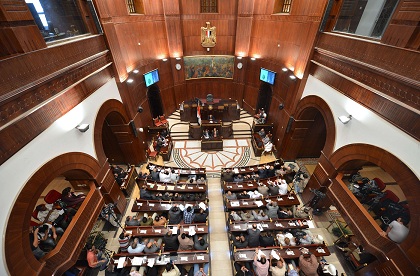CAIRO: Within a week of issuing a fatwa that Muslim women could not fill the top post in the country, Egypt’s mufti Sheikh Ali Gomaa has reversed course and said Islam does not bar women presidents.
He denied comments purportedly attributed to him published in Akhbar Al-Youm newspaper on Jan. 27 that women could not become presidents in Islam because they are not permitted to lead prayer rituals.
This ruling does not refer to the head of a modern state but to the traditional role of Caliph as both secular head of state and imam of the Muslims, he said in a statement Sunday, referring to a position that was abolished with the fall of the Ottoman empire in 1924. The head of state in a contemporary Muslim society – be he a president, prime minster or king – is no longer required or expected to lead Muslims in prayer. Therefore, it is permissible for women to hold the highest office in modern Muslim nations, he added. The original fatwa, as carried in the press, merely said a woman cannot be a head of state without specifying whether this applied to traditional or modern leadership positions.
But confusion on the matter persists. In comments made to The Daily Star Egypt on Jan. 31, Sheikh Mohmoud Ashour, former deputy of Al Azhar and member of the Islamic Research Center supported Gomaa’s ban on women presidents.
A fatwa (religious edict) published on the website of Dar Al Ifta, the official body issuing Islamic rulings, stated that a Muslim woman cannot be the head of state because it is the man s duty to lead Muslims in prayer, an obligation on the shoulders of a Muslim president.
Ashour stated in a previous interview with The Daily Star Egypt that women can occupy any position, including managerial and judicial posts, but may not be given the general presidency.
Islamic thinker Gamal El Bana, on the other hand, believes that nothing in Islam prevents Muslim women from becoming presidents.
The only criteria that presidents should be judged on is their efficiency to run the state, gender has no role to play . if the female candidate is better than the male candidate then she definitely should be chosen, El Bana said.
El Bana believes the Quran, holy book of Islam and main source of Sharia, does not indicate that Muslim women are prohibited from becoming presidents.
The Queen of Sheba was acknowledged in the Quran for her sound rule and wisdom, El Bana added.
However, it is not mentioned explicitly in the Quran that women could be presidents either, because as El Bana stated, it was not possible to introduce this to Arabian culture 1,400 years ago.
Ahmed Omar Hashim, member in the National Democratic Party (NDP) and president of the religious committee at the People’s Assembly, however, disagrees with El Bana and supports Gomaa’s fatwa.
Women cannot be presidents, but can be judges, he told The Daily Star Egypt. However, other Muslim nations like Pakistan and Bangladesh have routinely elected women leaders. With additional reports by AFP
